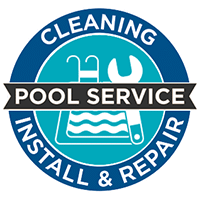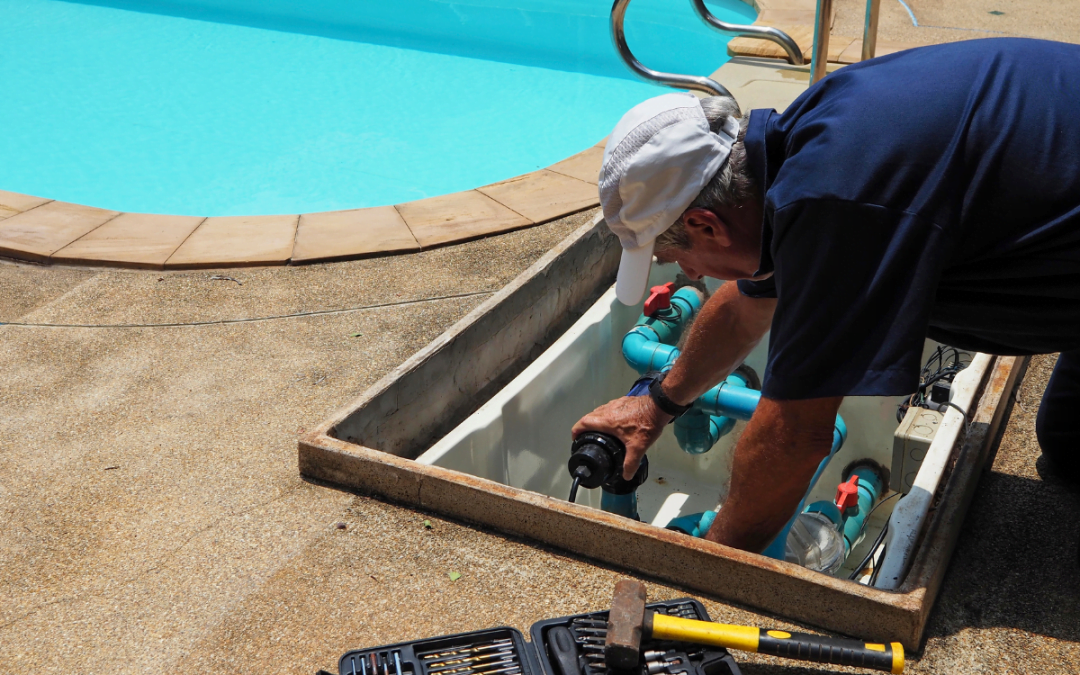When it comes to maintaining a saltwater pool, there are many different techniques and processes that need to be followed in order to keep your pool in good condition. Whether you are just starting out with your saltwater pool or you have had one for years, learning how to maintain it can be a challenge. Fortunately, a little knowledge of the right procedures and tools can go a long way in ensuring that your pool stays in perfect condition for years to come. And this essential guide to saltwater pool maintenance for beginners covers the most important factors to consider when caring for your pool.
With these tips in hand, you’ll have all the information that you need to keep your pool looking its best. So don’t wait any longer – dive in and learn the essentials of saltwater pool maintenance for beginners! You’ll soon be equipped with the knowledge and tools needed to keep your pool in top shape so you can enjoy it to its fullest.
Tips On How To Maintain A Saltwater Pool
Regular Maintenance Checks: What Pool Service Do You Need?
Regular pool maintenance checks are a crucial part of saltwater pool maintenance for beginners. By performing regular maintenance checks, you can ensure that your pool is clean, safe, and in good working order. When performing regular maintenance checks, you should inspect the water chemistry, check for any debris or algae in the pool, and inspect the filter and pump. You should also clean the pool regularly to maintain its cleanliness.
When performing maintenance checks, you should use the right cleaning supplies and tools. The right cleaning supplies should be used to keep your pool clean, safe, and in good working order. You should use a testing kit to test the water chemistry, a skimmer net to remove debris from the pool surface, and a vacuum cleaner to remove debris from the bottom of the pool.
When it comes to cleaning supplies, you should always choose quality products. Quality products will last longer and will help to extend the life of your pool. Additionally, depending on the type of pool you have, you may need to use different cleaning supplies. For example, saltwater pools typically require chlorine-based products to keep the water clean and safe, whereas freshwater pools may require a different type of cleaning product.
Finally, you should use the right tools for your pool maintenance checks. Depending on the type of pool you have, you may need to use different tools. For example, an above-ground pool may require a telescopic pole to reach the bottom of the pool, while an in-ground pool may require a vacuum cleaner or skimmer to reach the bottom of the pool.
Ensuring The Right Water Chemistry Levels In A Saltwater
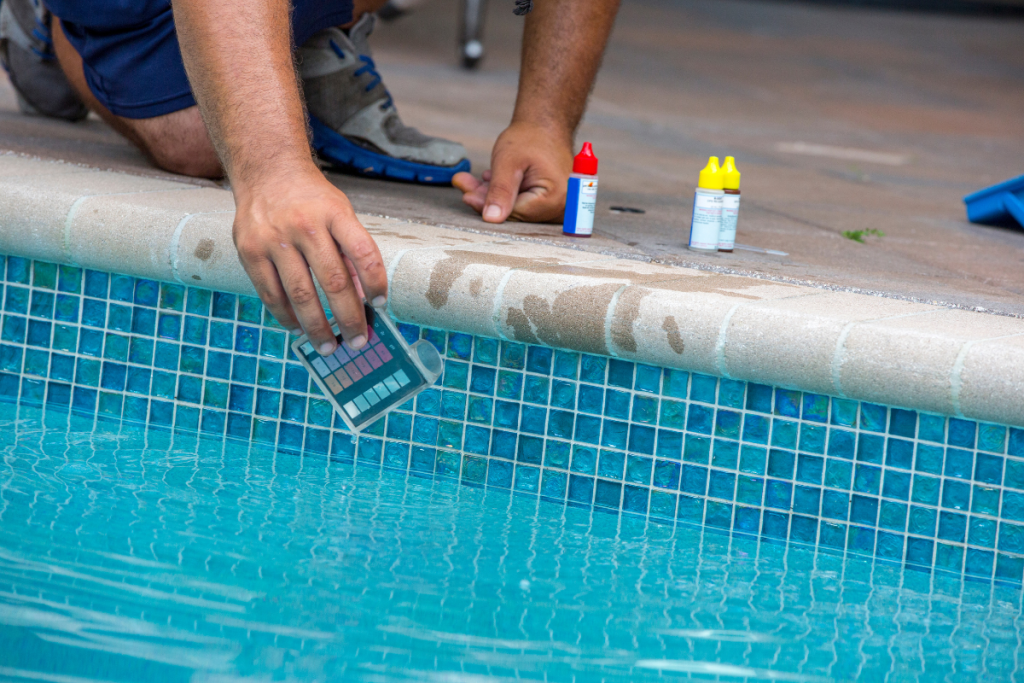
Keeping the water chemistry balance in a saltwater pool is essential for proper pool maintenance and a pleasant swimming experience. As a beginner, it is important to understand the basics of how to properly balance the water chemistry of your saltwater pool.
The pH level of a saltwater pool is one of the key components of managing water chemistry. The ideal pH range for a saltwater pool is 7.2 to 7.6, which is slightly more acidic than a traditional freshwater pool. Without a proper pH level, it can be difficult to maintain the other components of water chemistry, such as alkalinity, calcium hardness, and chlorine.
Alkalinity is another important part of maintaining the water chemistry of your saltwater pool. The ideal alkalinity range of a saltwater pool is 80 to 120 ppm (parts per million). The alkalinity of your pool should not fall below 80 ppm, as it can cause the pH levels to drop too low.
The calcium hardness of a saltwater pool should also be monitored. The ideal range of calcium hardness for a saltwater pool is 200 to 400 ppm. If the calcium hardness level of your pool is too low, it can cause scaling and damage to your pool equipment and surfaces.
Chlorine is also an important component of a saltwater pool. The ideal range for chlorine in a saltwater pool is 1.0 to 3.0 ppm. Without chlorine, bacteria and algae can quickly take over and make the pool unsafe for swimming.
Finally, shock treatment is an essential part of saltwater pool maintenance. Shock treatment helps to eliminate bacteria, algae, and other contaminants that can accumulate in a saltwater pool over time. It is important to use the appropriate type of shock treatment according to the size and volume of your pool.
Cleaning And Maintaining The Pool Water Filter
Cleaning and maintaining the pool filter is an essential part of saltwater pool maintenance for beginners. An unclean and unmaintained pool filter will reduce the lifespan of the pool equipment and can cause several problems such as water staining and excessive algae growth. To ensure your pool is kept in tip-top condition, it is important to clean and maintain the pool filter regularly.
The first step in cleaning and maintaining the pool filter is to remove any debris and dirt that have built up in the filter. This can be done by either manually cleaning the filter or by using a vacuum cleaner. If you use a vacuum cleaner, make sure to follow the manufacturer’s instructions as some filters may not be suitable for vacuuming. Once the filter is free from any debris, you should then backwash the filter. Backwashing is the process of cleaning the filter by forcing water in the opposite direction to the normal flow. This helps to remove any built-up dirt and debris from the filter.
After backwashing, you should then check the filter for any signs of damage or wear and tear. If you find any damage or wear and tear, it is important to replace the filter or repair any damaged parts as soon as possible to avoid any further problems with the pool.
Once the filter has been cleaned and inspected, it is important to regularly check the water pressure in the filter. This can be done by using a pressure gauge. If the pressure is too low, it means that the filter needs to be cleaned again. If the pressure is too high, it means that the filter is not functioning correctly and needs to be replaced.
Finally, you should regularly check the filter’s cartridge for any signs of wear and tear. Most filters have replaceable cartridges and if the filter is no longer effective, it is important to replace it. This is especially important for saltwater pools as salt can wear down the filter components faster.
Saltwater Pool: Preventative Tips For The Owners
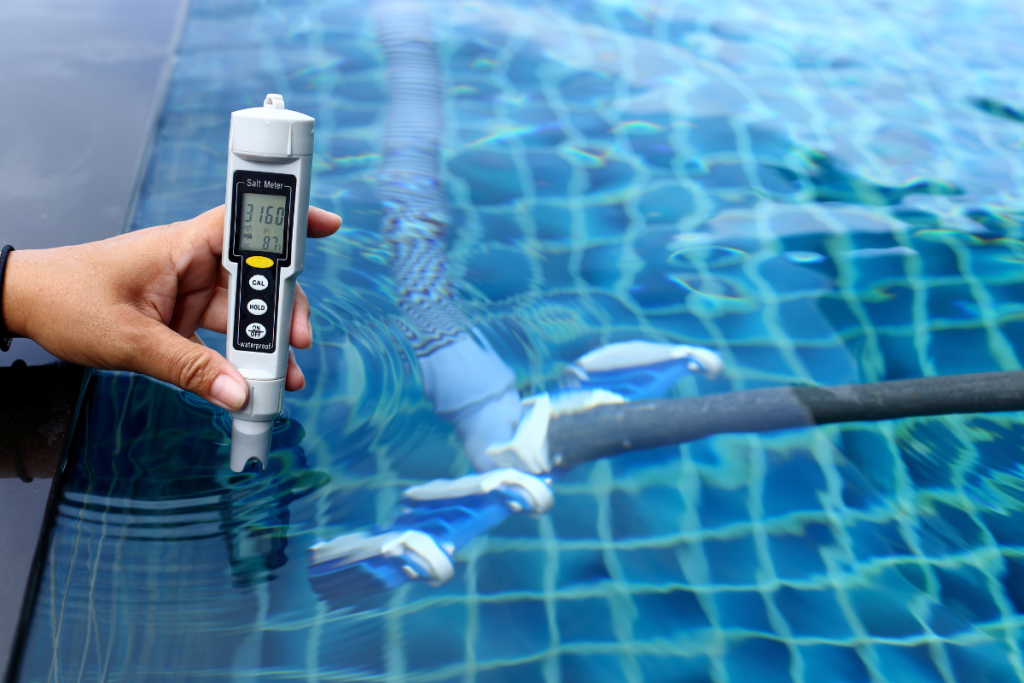
As a beginner saltwater pool owner, you may feel overwhelmed with all the different maintenance steps required to keep your pool clean and safe. However, with a few simple preventative tips, you can easily keep your saltwater pool in top condition. Here are some essential tips to help keep your pool looking and feeling its best:
- Test your water regularly: This is one of the most important steps when it comes to saltwater pool maintenance. Testing the water helps to identify any potential problems and alerts you to any changes in pH or chlorine levels. Test the water at least once a week and adjust the levels accordingly.
- Adjust your chlorine levels: In a saltwater pool, the chlorine levels should be adjusted manually. Test the water regularly and adjust the chlorine levels as necessary.
- Regularly clean your filter: The filter in a saltwater pool should be cleaned regularly to ensure it is working properly. Cleaning the filter regularly helps to prevent dirt, debris, and other impurities from clogging up the filter, keeping your water clean and clear.
- Replace the pool’s salt cell: The pool’s salt cell should be checked and replaced regularly to ensure it is functioning properly. This ensures that the pool’s chlorine levels remain consistent and that the water is safe for swimming.
- Balance the pH level: The pH level should be tested regularly and balanced accordingly. Balancing the pH will help to keep the water free of bacteria and algae.
- Brush the pool walls: Regularly brushing the pool walls helps to prevent algae and other contaminants from growing.
- Vacuum the pool: Vacuum your pool regularly to remove any debris that may have settled at the bottom of the pool. Vacuuming also helps to keep the water clean and clear.
Troubleshooting Common Salt Pool Problems
When it comes to saltwater pool maintenance for beginners, troubleshooting common issues should be your first line of defense. Taking care of your pool is a major part of keeping it healthy and functioning for years to come. Here are some common saltwater pool issues and how to troubleshoot them:
- Cloudy pool water: This is usually caused by a lack of chlorine or other chemicals in the pool, or by improper pH levels. To combat cloudy pool water, check the levels of chlorine, pH, and alkalinity and adjust accordingly.
- Problems with pool heater: If your pool heater isn’t working, the first place to check is the filter and pump. Make sure the filter and pump are clean and functioning properly. If not, replace them as soon as possible.
- Issues with saltwater chlorination system: If your saltwater chlorination system isn’t working, it might be because the salinity is too low or the pH is too high. Check the salinity and pH levels and adjust accordingly.
- Algae growth: Algae growth is often caused by poor maintenance of the pool. Make sure you’re brushing your pool regularly, using the right chemicals, and testing the pH and alkalinity levels.
- Pool leaks: If you notice any water leaking from your pool, the first thing to do is check the seals around the pool’s skimmer and other fittings. If the seals are worn or broken, repair or replace them.
Closing Thoughts On Saltwater Pool Maintenance
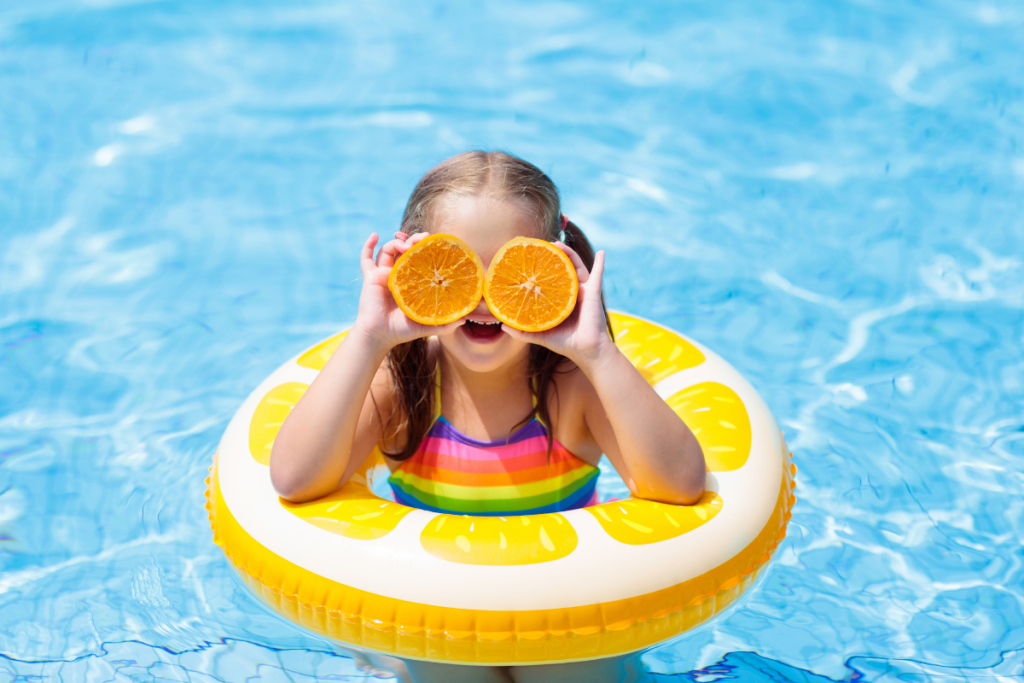
If you’re a new pool owner, you’ll need to learn the basics of saltwater pool maintenance for beginners. Taking proper care of a saltwater pool is essential to keeping your pool clean and functioning properly. So to help make the maintenance process easier, Clear Water Pools of Atlanta has put together a guide to saltwater pool maintenance for beginners.
The key to successful saltwater pool maintenance is consistency. And by following the essential tips for saltwater pool maintenance for beginners, you can keep your pool looking its best for years to come. But Clear Water Pools has the experience and knowledge to help you maintain a clean and healthy pool.
Saltwater pool maintenance for beginners can be complicated. But with the right knowledge and guidance, you can easily maintain a healthy and safe saltwater pool. So to learn more about saltwater pool maintenance for beginners and get the help you need, get expert advice from our pool builders only at Clear Water Pools of Atlanta.

